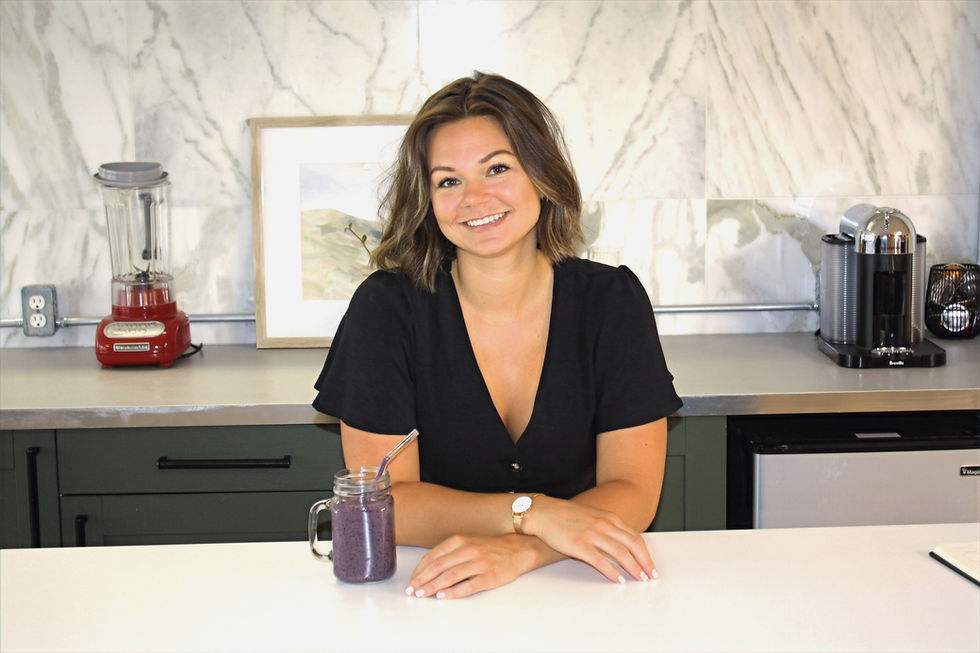What is Food Noise?
- Heather Bray

- May 27, 2025
- 3 min read
Updated: Jul 15, 2025
Have you ever found yourself thinking about food all day- what to eat, when to eat, or if you should eat at all? If so, you're not alone. This mental chatter has a name: food noise.
Due to the GLP-1 / Ozempic "craze" we're hearing more and more about the term Food Noise.
“Food noise” refers to the continuous stream of thoughts about food that can dominate your mind.
Food noise goes far beyond “what should I eat”- it often goes as far as stressful patterns of thinking, including body image.
Written by: Sasha Tran
Reviewed by: Heather Bray, RD

What Causes Food Noise?
Food noise can be caused by many different factors, including dietary habits, mental wellbeing, and even medical conditions.
Diet Patterns
Dieting and Food Restrictions: trying to eat “clean” or keep up with all the different diets can lead to rigidity and stress. Trying to follow a “perfect” diet can lead to louder and more critical thoughts on food. Thinking about food in a way that feels obsessive may be a sign that your diet is too restrictive.
If you spend a large percentage of your day thinking about food, it might mean you're not getting enough.
Mental Wellbeing
Stress and Anxiety: food can feel like an easy outlet when you’re stressed or anxious as your brain is more reactive and your body is craving comfort. Which can lead to emotional eating, and guilt after eating, fueling more food thoughts.
Perfectionism: if you struggle with control or perfectionism, it can often lead into your tendencies with food. Where you might feel guilty for eating “imperfectly”, or have certain food rules and expectations.
Medical Conditions
Digestive Disorders: having digestive disorders like IBS, food intolerances, celiac etc. can increase food-related anxiety and hyperfixate on “safe” foods. And people may mentally start tracking and fearing “trigger” foods.
Eating Disorders: eating disorders can create a lot of food noise, driven by guilt, fear, or control. These conditions are pointed by obsessive thoughts about food and body. Even in recovery, food noise can still be loud due to brain patterns that developed over time.
If you think you may be struggling with an eating disorder or know someone who might be, please contact your family doctor or therapist if you are working with one. You can also find more information at the National Eating Disorder Information Centre (NEDIC).

How to Quiet Food Noise
It definitely takes some effort to try and quiet food noise, but there are some ways that may help quiet the constant chatter going on in your head.
For starters ensuring that you’re feeding your body regularly, one reason why food can get stuck in your mind is because your body isn’t getting enough energy. Including protein, fat, and fiber in your meals can help you feel satisfied.
If you have strict food rules try and challenge them. Having strict rules like “only eat clean foods” or “no carbs after 6 p.m.” may seem like they’re useful in keeping you on track but, it could lead to guilt, obsession, and restriction.
Taking care of your whole self can help quiet food noise as being stressed or lack of sleep can make food cravings worse. Being stressed or tired can lead to poor food decisions, whether that be not eating or not eating whole meals. Life can get stressful at times which makes managing your life in a healthy way difficult.
If you need help managing your stressors talking to a therapist can be beneficial, they may also be able to help with emotional hunger.
A dietitian- who is especially trained in intuitive eating, disordered eating, or a non-diet approach can be very helpful when it comes to quieting food noise.
Although food noise is partly mental, it’s also related to nutrition patterns, and your personal history with food.
Final Thoughts
Food noise seems inevitable especially with social media as it seems that everyone has an opinion on what’s “healthy” or they’re starting a new diet. It’s important to recognize what food noise is and how it may be affecting you.
Food noise can be exhausting- mentally, emotionally, and even physically. Quieting food noise isn’t about getting stronger willpower or following the next diet. It’s about rebuilding that trust with food, your body, and yourself.
Want support reducing food noise and redefining your relationship with food?
Explore The Empowered Eating Journey — your self-paced path to food freedom, body trust, and peace of mind.
If you'd like to speak with a Registered Dietitian for more information, please reach out to us here.





